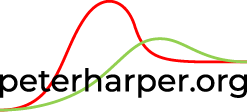PERMACULTURE
Permaculture is a term like 'socialism' or 'Christianity': you might think you know what it means, but if you actually try to spell it out you will provoke a storm of disagreement from others who also think they know what it means.
Much the same might be said of 'sustainability'. It covers an absurd range of meanings and is widely used to create an illusion of harmony and agreement. To make it genuinely useful it must be re-defined in terms of quantifiable proxies. Once you have done this, you have a common language and can objectively measure the way things are, how you are doing, and the effect of any proposed measures.
Encountering the notion of Permaculture, I naturally wanted to apply a similar degree of rigour, but it has proved much more difficult than I expected! With some notable exceptions, people attached to Permaculture do not want the concept defined, probed, quantified, put to test. This is not necessarily a bad thing.
Should I then politely back off and leave them to it? Probably that would have been best, but my views are often sought, and I feel an obligation to help separate environmental wheat from chaff, to clarify and if possible Do the Numbers. A lot of things various bits of the environmental movement say are mistaken, and it is important to identify mistakes, correct them and move on.
The items here are all attempts to sort things out, and to try and separate wheat from chaff. The first is a contribution to the Permaculture Teachers' Handbook.
What? Car Maintenance on a Permaculture Course?
In a similar vein, but more abstract and philosophical:
Tools, Design and Permaculture 2004/8
The third is a comparison between Permaculture and Alternative Technology. Are they actually the same thing? Should they be? If not, why not?
AT and Permaculture: A Case of Yin and Yang?
The fourth was written at the invitation of the Permaculture magazine in the UK. It is rather rambling, but offers a range of challenges, most of which were never properly answered. It was widely reprinted and funnily enough, translated into Dutch and German, so some must have thought it worth the effort.
A critique of Permaculture 1998-2012 (doc)
More recently the editor of The Land asked to reprint the last item, and I thought it was probably time to re-mount a challenge that was never properly taken up, with the intention that we should all march forward together. This one was translated into German and French.
Permaculture: The Big Rock-Candy Mountain 2013 (doc)
Using plants for shade. In the winter, the vine is cut back, allowing the low sunshine in. During summer the leaves shade the space underneath, and the plant (a kiwi vine) also provides fruit. This is an ancient idea, widely used in Mediterranean countries, but popularised by the Permaculture movement. Many of the ideas in Permaculture are such ‘old wine in new bottles’ but perhaps none the worse for that.

